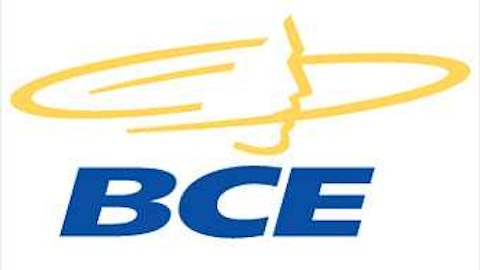Traditional phone companies have disappeared. Telephone companies today offer wireless services, satellite television, and broadband Internet in addition to landlines. Portugal Telecom, SGPS (ADR) (NYSE:PT), BCE Inc. (USA) (NYSE:BCE), and Telefonica Brasil SA (ADR) (NYSE:VIV) are some of the companies active in telecom that will be looked upon to assess these expanding prospects.

Competition immune
Canada’s largest communications company, BCE Inc. (USA) (NYSE:BCE), has recently entered the multimedia business, and its main segments are: land and wireless phones, satellite communications and television, Internet and data services. Also, the firm has recently completed the acquisition of Astral and announced important debenture redemption.
Today, BCE Inc. (USA) (NYSE:BCE) is looking to improve cost reduction policies, capital investment, and labor skills in order to meet short-term profitability and revenue objectives. Additionally, new government regulation, bandwidth improvement, collective labor negotiations, and further acquisitions will be addressed. Tomorrow, the firm will benefit from a solid performance in the wireless segment, reduced customer erosion in the landline segment, and continued expansion of its media segment. Growth and improved performance will allow management to reward shareholders accordingly and complete a successful transition to the media segment.
Finances show that revenue and operating margin have stabilized during the last decade, while net income has seen an impressive growth. Total debt, in the same time, has seen a small increase. Today, the company holds one of the highest operating and net margins in the industry. All around, BCE Inc. (USA) (NYSE:BCE) is financially solid.
BCE Inc. (USA) (NYSE:BCE) trades at 12.6 times its TTM earnings, representing a 43% discount to industry averages, paying quarterly dividends of $0.5825 equal to a 5.58% yield at the current stock price. I recommended a buy: New competitors may pay a lower entry price, but keeping up competition will be difficult thanks to BCE Inc. (USA) (NYSE:BCE)’s market position and early transition to the media sector.
Mobile phone exhaustion
Headquartered in Sao Paolo, Telefónica Brazil, a.k.a. Vivo, provides communication, information, and entertainment solutions for 90 million customers. Although, recently the firm made the news due to a stock price drop, hedge funds have continued to increase their positions. Last, being part of Spanish Telefónica has given its Brazilian counterpart a great backing expertise and know-how.
Coming shortly, Telefonica Brasil SA (ADR) (NYSE:VIV) will be faced with exhaustion of the mobile sector. Further down the road, it should focus on improving margins affected by TV subscription cancellations and tighter competition in the phone market. Hence, the company is expected to widen its subscription base for all segments, and expand its network in order to better exploit its market-leading position. Given the firm is expected to invest in the media sector, growth will be limited at first but holds promising prospects for the long term.
When looking at the balance sheet, the company’s standing is good. Revenue, net income, and cash flow have seen incremental increases in the last five years, while operating margin remains above 20%. In the last two years, however, debt has experienced a concerning growth. So long as cash volume is stable, debt will not be an issue, but it’s worth watching.
Currently trading at 4.3 times its earnings, meaning an 80% discount to industry peers, paying quarterly dividend of $0.4762 which is a 5.77% yield, and a price tag very close to the 52-week low, the stock does look very cheap. However, I recommended to hold until Telefonica Brasil SA (ADR) (NYSE:VIV) shows some success in the TV business as an option to mobile phone exhaustion.
Brazil will keep you afloat
Portugal Telecom, SGPS (ADR) (NYSE:PT) is a telecommunications and multimedia provider, with activities in Portugal and Brazil mainly, and a smaller presence in Africa. The firm has recently sold its operations in Macau and is expected to open a new data centre in Covilha. But can the business produce profits in the back of a lagging economy?




